- Home
- David Downing
Silesian Station (2008) jr-2 Page 2
Silesian Station (2008) jr-2 Read online
Page 2
A man was looking at her, a questioning expression on his face. He was wearing a uniform, but not, she thought, a military one. He seemed too old to be a soldier.
He came towards her, smiling and raising his peaked cap. 'I'm here to collect you,' he said.
'My uncle sent you?' she asked.
'That's right.'
'Is he all right?'
'He's fine. Nothing to worry about. Some urgent business came up, that's all.' He reached out a hand for her suitcase. 'The car's outside.'
Into the Cage
John Russell lifted his glass, reluctantly tipped the last drops of malt down his throat, and placed it ever so gently down on the polished wooden bar. He could have another, he supposed, but only if he woke the barman. Twisting on his stool, he found an almost depopulated ballroom. A threesome at a distant table was all that remained - the blonde torch singer who had been making everyone nostalgic for Dietrich and her two uniformed admirers. She was looking from one to the other as if she was trying to decide between them. Which she probably was.
It was gone three o'clock. His twelve-year-old son Paul had been asleep in their cabin for almost five hours, but Russell still felt too restless for bed. A turn round the deck, he told himself, a phrase which suggested ease of movement, not the obstacle course of couples in thrall to passion which usually presented itself at this hour. Why didn't they use their cabins, for God's sake? Because their wives and husbands were sleeping in them?
He was getting obsessive, he thought, as he took the lift up to the boat deck. Four weeks away from his girlfriend Effi and all he could think of was sex. He smiled to himself at the thought. Thirty more hours at sea, five from Hamburg to Berlin.
It was a beautiful night - still warm, the slightest of breezes, a sky over-flowing with stars. He started towards the bow, staring out across the darkly rolling sea, wondering when the French and British coastlines would become visible. Soon, he guessed - they were due to make their stop at Southampton before midday.
He stopped and leant his back against the railings, gazing up at the smoke from the twin funnels as it drifted across the Milky Way. He hoped Effi would like her presents, the red dress in particular. He had gifts for Paul's mother Ilse and her brother Thomas, things that could no longer be found in Hitler's never-ending Reich, things - as the popular phrase had it - from 'outside the cage'.
He sighed. Nazi Germany was everything its enemies said it was, and often worse, but he would still be glad to be back. America had been wonderful, and he had finally managed to swap his British passport for an American one, but Berlin was his home. Their home.
He turned to face the sea. Away on the distant horizon a tiny light was flashing at regular intervals. A lighthouse, presumably. An extremity of France. Of Europe.
It really was time for bed. He walked back down the starboard side and slowly descended seven decks' worth of stairs. As he let himself into their cabin he noticed the folded sheet of paper which had been pushed under the door. He picked it up, backed out into the corridor, and studied it under the nearest light. It was a four-word telegram from Effi's sister Zarah: 'Effi arrested by Gestapo'.
Light was edging round the porthole curtain when he finally got to sleep, and two hours later he was woken, accidentally-on-purpose, by his son. 'It's England,' Paul said excitedly, wiping his breath from the glass. The Dorset coast, Russell guessed, or maybe Hampshire. The town they were passing looked large enough for Bournemouth.
Sitting in the bathroom, he wondered whether it would be quicker to leave the ship at Southampton. One train to London, another to Dover, a boat to Ostend, more trains across Belgium and Germany. It might save a couple of hours, but seemed just as likely to add a few. And he very much doubted whether the Europa carried copies of the relevant timetables. He would just have to cope with twenty-four hours of inaction.
At breakfast the elderly couple who had shared their table since New York seemed even more cheerful than usual. 'Another beautiful day,' Herr Faeder announced, unaware that his upraised fork was dripping egg yolk onto the tablecloth. 'We've been really lucky on this voyage. Last year we were trapped in our cabins for most of the trip,' he added for about the fourth time. Russell grunted his agreement, and received a reproachful look from Paul.
'I can't wait to get home, though,' Frau Faeder said. 'I have a feeling this is going to be a beautiful summer.'
'I hope you're right,' Russell said amicably. The Faeders probably came from another planet, but they'd been pleasant enough company.
Once they'd hurried off to claim their favourite deck chairs, he poured himself another coffee and considered what to tell Paul. The truth, he supposed. 'A telegram came for me last night,' he began. 'After you were asleep.'
His son, engrossed in chasing the record for the largest amount of jam ever loaded onto a single piece of toast, looked up in alarm.
'Effi's been arrested,' Russell told him.
Paul's jaw dropped open. 'What for?' he eventually asked.
'I don't know. The telegram just said she'd been arrested.'
'That's...' He searched for an adequate word. 'That's terrible.'
'I hope not.'
'I expect she said something,' Paul volunteered after a few moments' thought. 'That's not very serious. Not like murder or treason.'
Russell couldn't help smiling. 'You're probably right.'
'What are you going to do?'
'I can't do anything until we get back. And then...I don't know.' Kick up a fuss, he thought, but better not to tell Paul that.
'I'm sorry, Dad.'
'Me too. Well, there's nothing we can do now. Let's get up on deck and watch the world go by.'
As Herr Faeder had said, it was a beautiful day. The Europa, as they discovered on reaching the bow, was in mid-Solent. 'That's Lymington,' Paul said, after consulting his carefully-copied version of the large chart below decks, 'and that's Cowes,' he added, pointing off to the right. Many small boats were in view, a couple of yachts to the south, white sails vivid against the darker island, a flurry of fishing craft to the north, sunlight flashing off their cabin windows. Only the squawking gulls disturbed the peace.
'I had a wonderful time,' Paul said suddenly. 'The whole trip, I mean.'
'So did I,' Russell told him. He smiled at his son, but his heart ached. He knew why Paul had chosen this moment to say what he had, and what he might have added had he been a few years older. His son was a German boy in a German family, with an English father and an American grandmother, and he was growing up in a Germany that seemed bound for war with one or both of those countries. For four happy weeks the boy had been able to step outside the competing inheritances which defined his life, but now he was going home, to where they mattered most.
And though Paul would never say so, Effi's arrest could only make things worse.
They spent most of the day outside, watching the to-ings and fro-ings at Southampton, the warships anchored in The Nore roadstead off Portsmouth, the freighters in the Channel. The setting sun was colouring the white cliffs gold as they passed through the Straits of Dover, the lights brightening on the Belgian coast as darkness finally fell. They went to bed earlier than usual, but despite hardly sleeping the previous night Russell was still wide awake. He lay there in the dark, wondering what had happened, where Effi was. Maybe she'd already been released. Maybe she was en route to the new women's concentration camp at Ravensbruck. The thought brought him close to panic.
The Europa docked at Hamburg soon after ten the following morning. It seemed an eternity before disembarkation was underway, but the queue at passport control moved quickly enough. Russell was expecting a few questions about his passport - he'd left the Reich four weeks earlier as a UK citizen and was now returning as an American - but the German Consulate in New York had assured him that his resident status would be unaffected.
The officer took one look at Russell's passport and one at his face before calling over his supervisor, an overweight man with a l
arge boil above one eye. He too examined the passport. 'You are travelling directly to Berlin?' he asked.
'Yes.'
'The Berlin Gestapo wish to interview you. About a relative who has been arrested, I believe. You know about this?'
'Yes.'
'You must report to Hauptsturmfuhrer Ritschel at the Prinz Albrecht-Strasse offices. You must go straight there. Understood?'
'I need to take my son home first.'
The man hesitated, caught in the familiar Nazi dilemma - human decency or personal safety. 'That would be inadvisable,' he said, reaching for the best of both worlds. 'I'm back,' Russell thought.
There were no questions about his passport, no search through their American purchases at customs. The taxi-ride to the station reminded Russell of his last visit to the city, when he'd been reporting on the launching of the battleship Bismarck, and the wonderful sight of Hitler struggling to contain himself as the ship refused to move.
Arriving at the station, he bought what seemed the most likely newspaper, but could find no reference to Effi's arrest. He didn't know, of course, how long she had been in custody. There were forty minutes until the next D-Zug express left for Berlin, so he parked Paul and the bags at a concourse cafe table and found a public telephone. Without a full address he had almost to beg the operator for Zarah's number, and the telephone rang about a dozen times before she answered.
'Zarah, it's John.'
'You're back? Thank God.'
'I'm in Hamburg. I'll be in Berlin this afternoon. Is Effi all right?'
'I don't know,' Zarah almost wailed. 'They won't let me see her. I've tried. Jens has tried.'
That was bad news - Zarah's husband Jens was a ranking bureaucrat and ardent Nazi, with all the influence that combination implied. 'What has she been arrested for?'
'They won't tell me. Two men from the Gestapo came to the house, told us that she had been arrested, and that I was to let you know by telegram - they even told me what ship you were on. They said not to tell anyone else.'
'Has there been anything in the newspapers?' Russell asked, suspicion growing.
'Nothing. I don't understand it. Do you?' she asked, more than a hint of accusation in her voice.
'No,' Russell said, though he probably did. 'I'll be back in Berlin about four,' he told her. 'The Gestapo want to see me the moment I arrive. I'll call you after I've seen them.'
He hung up and rang a more familiar number, that of Paul's mother and stepfather. Ilse picked up. Russell briefly explained what had happened, and asked if she could meet the train at Lehrter Station. She said she would.
He walked back across the busy concourse, feeling both relieved and depressed. The whole thing was a setup, aimed at him. Why else keep it quiet? Effi might have said something out of turn and been reported - it was hardly out of character - but when it came down to it the Gestapo were more than capable of simply making something up. Whichever it was, they had their leverage against him. Which was good news and bad news. Good because it almost certainly meant that he could secure Effi's release, bad because of what they would want in return.
Paul was looking at the newspaper. 'The Fuhrer revealed that the new Chancery would have another purpose from 1950,' he read aloud, 'but declined to say what that would be.'
A lunatic asylum, Russell guessed, but he didn't think his son would appreciate the joke.
'Can we go up to the platform?' Paul asked.
'Why not.'
The D-Zug was already standing there, a long red bullet of a train. Paul placed a palm on its shiny side, and Russell could almost hear him thinking: 'This is what Germans can do.'
They finished lunch an hour into the journey, and Russell slept fitfully for most of the rest. Ilse and her husband Matthias were waiting on the Lehrter Station concourse, and both seemed really pleased to see Paul. Russell thanked them for coming.
'Do you want a lift?' Matthias asked.
'No thanks.' The idea of them all drawing up outside the Gestapo's Prinz Albrecht-Strasse HQ for a family visit seemed almost surreal, not to mention unwise.
'I hope it's all right,' Paul said. 'Send Effi...tell her I want us to visit the Aquarium again.'
'Yes, call us,' Ilse insisted.
'I will. But don't tell anyone else about her arrest. The Gestapo don't want any publicity.'
'But...' Ilse began.
'I know,' Russell interrupted her. 'But we can always make a stink later, if we need to.'
Goodbyes said, Russell deposited his suitcases in the station left luggage and hailed a cab. 'Prinz Albrecht-Strasse,' he said, 'the Gestapo building.' The cabbie grimaced in sympathy.
It was usually a ten minute ride, but the evening rush hour was underway and the bridges across the Spree were choked with traffic. The eastern end of the Tiergarten was crowded with walkers enjoying the late afternoon sunshine. 'The summer before the war,' Russell murmured to himself. Or maybe not.
The traffic thinned after the Potsdamer Platz traffic lights, and disappeared altogether as they swung into Prinz Albrecht-Strasse. The cabbie took Russell's money, joked that he wouldn't wait, and drove off towards the Wilhelmstrasse. Staring up at the grey, five-storey megalith, Russell could see his point.
He'd been in worse places, he told himself, and even managed to think of a couple. Pushing his way through the heavy front doors, he found himself surrounded by the usual high columns and curtains. A great slab of a desk stood in front of a flag which could have clothed half of Africa, always assuming the locals liked red, white and black. Behind the desk, looking suitably dwarfed by his surroundings, a man in official Gestapo uniform - not the beloved leather coat - was reading what looked like a technical manual of some sort. He ignored Russell's presence for several seconds, then gestured him forward with an impatient flick of a finger.
'My name is John Russell, and I have an appointment with a Hauptsturmfuhrer Ritschel,' Russell told him.
'For what time?'
'I was asked to come here as soon as I reached Berlin.'
'Ah.' The receptionist picked up the telephone, dialled a three-figure number, and asked if Hauptsturmfuhrer Ritschel was expecting a John Russell. He was. Another call produced a uniformed Rottenfuhrer to escort Herr Russell upstairs. He followed the shiny boots up, wondering why the Gestapo rarely wore their uniforms out of doors. A need for anonymity, he supposed. And Heydrich probably liked to economize on laundry bills.
The stone corridors were infinitely depressing. So many offices, so many thugs behind desks.
Hauptsturmfuhrer Ritschel looked the part. A shortish man with thinning fair hair, a face full of ruptured blood vessels and eyes the colour of canal water. There were beads of sweat on his brow, despite the wide open window and a shirt open at the collar. His leather coat was hanging on the door. 'Herr John Russell?' he said. 'How would you like to see Fraulein Koenen?'
'Very much.'
'You may have five minutes. No physical contact.' He turned to the Rottenfuhrer. 'Take him down and bring him back.'
This time they took a lift. The floors were numbered in the usual way, which seemed somewhat incongruous in the circumstances; basement, in particular, seemed a less than adequate description of the cell-lined corridor which awaited them. The silence of the grave was Russell's first impression, but this was soon superseded. A woman sobbing behind one door, a restless shuffle of feet behind another. A man's voice intoning 'shut up, shut up, shut up' as if he'd forgotten he was still speaking.
Oh my God, Russell thought. What had they done to her?
The Rottenfuhrer stopped outside the penultimate door on the right, pulled back the sliding panel for a brief glimpse inside, and drew back the two massive bolts. The door opened inwards, revealing Effi in the act of getting to her feet. As she spotted Russell behind the Rottenfuhrer her face lit up, and she almost jumped towards him.
'No physical contact,' the Gestapo man said, spreading his arms to keep them apart.
They stood facing each other.
She was wearing grey overalls that lapped around her wrists and ankles, making her look more waif-like than ever. Her black hair looked tousled and unusually dull. She tucked one strand behind an ear. 'I never liked grey,' she said.
'How long have you been here?' Russell asked.
'Three nights and three days.'
'Have they hurt you?'
She shook her head. 'Not my body, anyway. But this is not a nice place.'
'Have they told you why you've been arrested?'
Effi smiled ruefully. 'Oh yes. That bitch Marianne Schoner informed on me. You know she never forgave me for getting the part in Mother. According to her, I said that Hitler had achieved the impossible - he'd surrounded himself with midgets yet still managed to look small.'
'But you didn't say it?'
'I probably did. It's not bad, is it? No, don't answer that - they'll have you in here too.'
It was his turn to smile. She was scared and she was angry, but there was still fire in her eyes. 'They've only given us five minutes. I'll get you out of here, I promise.'
'That would be good.'
'I love you.'
'And I you. I had much better plans for your homecoming than this.'
'They'll keep. Paul sends his love, wants to go to the Aquarium with you again.'
'Send him mine. Have you seen Zarah? Does she know I'm in here?'
'She's frantic with worry. They wouldn't let her see you.'
'Why not, for God's sake?
'I think this is aimed at me.'
She gave him a surprised look.
'There's nothing in the papers, nothing to stop them simply letting you go if they get something in return.'
She rubbed the side of her face. 'Why didn't I think of that? Oh I'm sorry, John. I should learn to keep my mouth shut.'
'I wouldn't want that.'
'What do they want from you?'
'I don't know yet. Just some favourable press, perhaps.' He glanced at the Rottenfuhrer, as if inviting him to join the conversation.

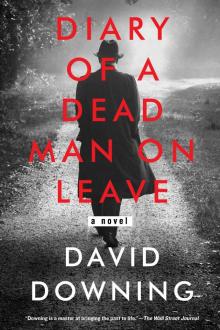 Diary of a Dead Man on Leave
Diary of a Dead Man on Leave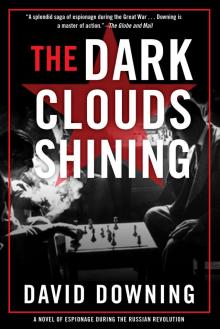 The Dark Clouds Shining
The Dark Clouds Shining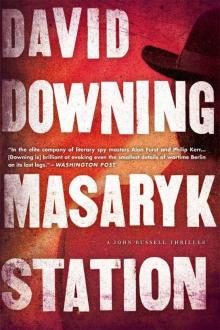 Masaryk Station (John Russell)
Masaryk Station (John Russell)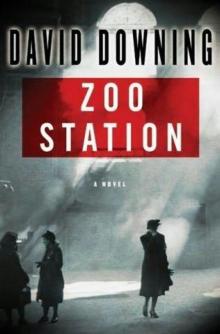 Zoo Stationee
Zoo Stationee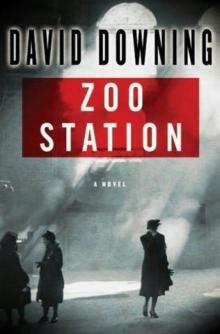 Zoo Station jr-1
Zoo Station jr-1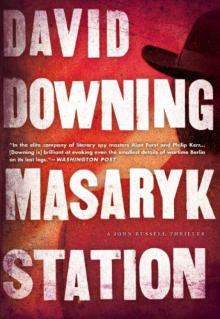 Masaryk Station
Masaryk Station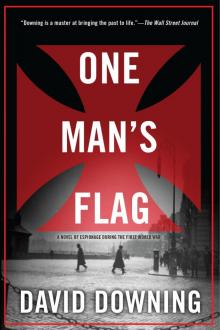 One Man's Flag
One Man's Flag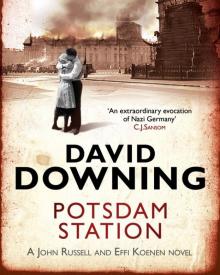 Potsdam Station jr-4
Potsdam Station jr-4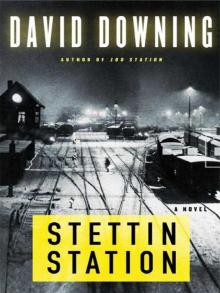 Stattin Station jr-3
Stattin Station jr-3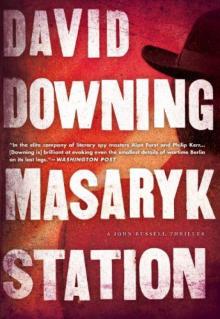 Masaryk Station jr-6
Masaryk Station jr-6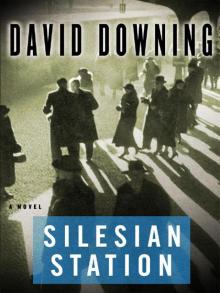 Silesian Station (2008) jr-2
Silesian Station (2008) jr-2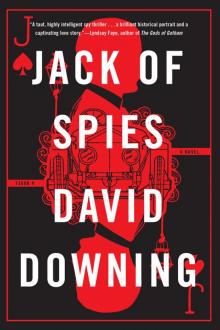 Jack of Spies
Jack of Spies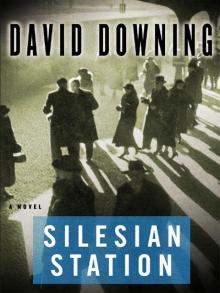 Silesian Station (2008)
Silesian Station (2008) The Moscow Option
The Moscow Option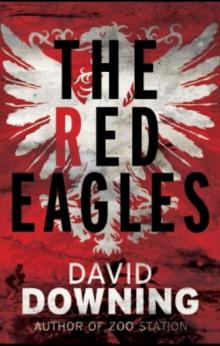 The Red Eagles
The Red Eagles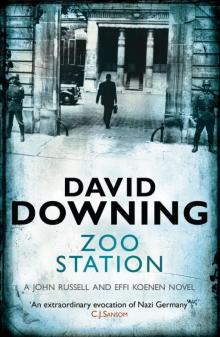 Zoo Station
Zoo Station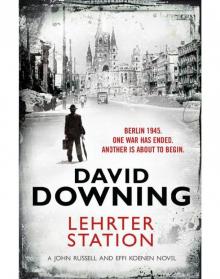 Lehrter Station
Lehrter Station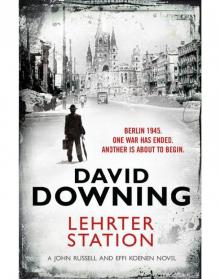 Lehrter Station jr-5
Lehrter Station jr-5